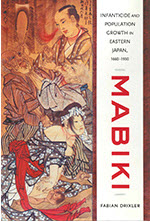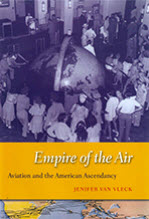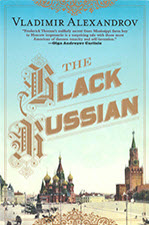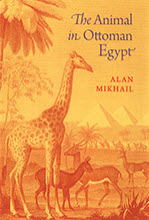Fabian Drixler, Jenifer Van Vleck, Alan Mikhail, and Vladimir Alexandrov Awarded International Book Prize by The MacMillan Center
April 24, 2014. New Haven, CT—Fabian Drixler, Assistant Professor of History, and Jenifer Van Vleck, Assistant Professor of History and American Studies, were both awarded the Gaddis Smith International Book Prize for best first book. Drixler for Mabiki: Infanticide and Population Growth in Eastern Japan, 1660-1950 (University of California Press, 2013), and Van Vleck for Empire of the Air: Aviation and the American Ascendancy (Harvard University Press, 2013). Vladimir Alexandrov, B. E. Bensinger Professor of Slavic Languages & Literatures, and Alan Mikhail, Professor of History, were both awarded the Gustav Ranis International Book Prize for best book. Alexandrov for The Black Russian (Atlantic Monthly Press, 2013), and Mikhail for The Animal in Ottoman Egypt (Oxford University Press, 2014).

Established in 2004 to recognize the distinguished legacy of two former Directors of the MacMillan Center, the prizes are awarded for books on international topics written by current members of the Yale faculty. Award recipients receive a research appointment at the MacMillan Center, and a $5,000 research award over two years.
 Mabiki tells the story of a society reversing deeply held worldviews and revolutionizing its demography. In parts of eighteenth-century Japan, couples raised only two or three children. As villages shrank and household headcounts dwindled, posters of childmurdering she-devils began to appear, and governments offered to pay their subjects to have more children. In these pages, the long conflict over the meaning of infanticide comes to life once again. Those who killed babies saw themselves as responsible parents to their chosen children. Those who opposed infanticide redrew the boundaries of humanity so as to encompass newborn infants and exclude those who would not raise them. In Eastern Japan, the focus of this book, population growth resumed in the nineteenth century. According to its village registers, more and more parents reared all their children. Others persisted in the old ways, leaving traces of hundreds of thousands of infanticides in the statistics of the modern Japanese state. Nonetheless, by 1925, total fertility rates approached six children per women in the very lands where raising four had once been considered profligate.
Mabiki tells the story of a society reversing deeply held worldviews and revolutionizing its demography. In parts of eighteenth-century Japan, couples raised only two or three children. As villages shrank and household headcounts dwindled, posters of childmurdering she-devils began to appear, and governments offered to pay their subjects to have more children. In these pages, the long conflict over the meaning of infanticide comes to life once again. Those who killed babies saw themselves as responsible parents to their chosen children. Those who opposed infanticide redrew the boundaries of humanity so as to encompass newborn infants and exclude those who would not raise them. In Eastern Japan, the focus of this book, population growth resumed in the nineteenth century. According to its village registers, more and more parents reared all their children. Others persisted in the old ways, leaving traces of hundreds of thousands of infanticides in the statistics of the modern Japanese state. Nonetheless, by 1925, total fertility rates approached six children per women in the very lands where raising four had once been considered profligate.
 Empire of the Air reveals the central role commercial aviation played in the United States’ rise to global preeminence in the twentieth century. As U.S. military and economic influence grew, the federal government partnered with the aviation industry to carry and deliver American power across the globe and to sell the very idea of the “American Century” to the public at home and abroad. The airplane promised to extend the frontiers of the United States. As it accelerated the global circulation of U.S. capital, consumer goods, technologies, weapons, popular culture, and expertise, few places remained distant from the influence of Wall Street and Washington. Aviation promised to secure a new type of empire—an empire of the air instead of the land—that emphasized access to markets rather than the conquest of territory and made the entire world America’s sphere of influence. By the late 1960s, however, foreign airlines and governments were challenging America’s control of global airways, and the domestic aviation industry hit turbulent times. Just as the history of commercial aviation helps to explain the ascendance of American power, its subsequent challenges reflect the limits and contradictions of the American Century.
Empire of the Air reveals the central role commercial aviation played in the United States’ rise to global preeminence in the twentieth century. As U.S. military and economic influence grew, the federal government partnered with the aviation industry to carry and deliver American power across the globe and to sell the very idea of the “American Century” to the public at home and abroad. The airplane promised to extend the frontiers of the United States. As it accelerated the global circulation of U.S. capital, consumer goods, technologies, weapons, popular culture, and expertise, few places remained distant from the influence of Wall Street and Washington. Aviation promised to secure a new type of empire—an empire of the air instead of the land—that emphasized access to markets rather than the conquest of territory and made the entire world America’s sphere of influence. By the late 1960s, however, foreign airlines and governments were challenging America’s control of global airways, and the domestic aviation industry hit turbulent times. Just as the history of commercial aviation helps to explain the ascendance of American power, its subsequent challenges reflect the limits and contradictions of the American Century.
 The Black Russian is the true story of Frederick Bruce Thomas, born in 1872 to former slaves who became prosperous farmers in Mississippi. After his father was brutally murdered, Frederick left the South and worked as a waiter in Chicago and Brooklyn. Seeking greater freedom, he traveled to London, then crisscrossed Europe, and—in a highly unusual choice for a black American at the time—went to Russia. Because he found no color line there, Frederick settled in Moscow, becoming a rich and famous owner of variety theaters and restaurants. When the Bolshevik Revolution ruined him, he barely escaped to Constantinople, where he made another fortune by opening celebrated nightclubs as the “Sultan of Jazz.” However, the long arm of American racism, the xenophobia of the new Turkish Republic, and Frederick’s own extravagance landed him in debtor’s prison. He died in Constantinople in 1928.
The Black Russian is the true story of Frederick Bruce Thomas, born in 1872 to former slaves who became prosperous farmers in Mississippi. After his father was brutally murdered, Frederick left the South and worked as a waiter in Chicago and Brooklyn. Seeking greater freedom, he traveled to London, then crisscrossed Europe, and—in a highly unusual choice for a black American at the time—went to Russia. Because he found no color line there, Frederick settled in Moscow, becoming a rich and famous owner of variety theaters and restaurants. When the Bolshevik Revolution ruined him, he barely escaped to Constantinople, where he made another fortune by opening celebrated nightclubs as the “Sultan of Jazz.” However, the long arm of American racism, the xenophobia of the new Turkish Republic, and Frederick’s own extravagance landed him in debtor’s prison. He died in Constantinople in 1928.
 The Animal in Ottoman Egypt putsthe history of human-animal relations at the center of the transformations of the Ottoman Empire from the sixteenth to the nineteenth centuries. The history of the empire’s most important province, Egypt, is used to explain how human interactions with livestock, dogs, and charismatic megafauna changed more in a few centuries than they had for millennia. The human world became one in which animals’ social and economic functions were diminished. Without animals, humans had to remake the societies they had built around the intimate and cooperative interactions between species. The political and even evolutionary consequences of this separation of people and animals were wrenching and often violent.
The Animal in Ottoman Egypt putsthe history of human-animal relations at the center of the transformations of the Ottoman Empire from the sixteenth to the nineteenth centuries. The history of the empire’s most important province, Egypt, is used to explain how human interactions with livestock, dogs, and charismatic megafauna changed more in a few centuries than they had for millennia. The human world became one in which animals’ social and economic functions were diminished. Without animals, humans had to remake the societies they had built around the intimate and cooperative interactions between species. The political and even evolutionary consequences of this separation of people and animals were wrenching and often violent.
Contact Information:
Marilyn Wilkes
The Whitney and Betty MacMillan Center for International and Area Studies at Yale
(203) 432-3413
